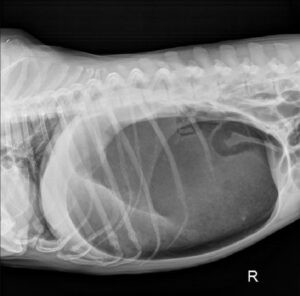
How do you know if your dog has gastric dilatation and volvulus (GDV)?
How do you know if your dog has gastric dilatation and volvulus (GDV)? What are the symptoms of GDV? Known as canine bloating, this fatal disorder primarily affects large, deep-chested dogs. In this article, Mount Carmel Animal Hospital informs us more about gastric dilatation and volvulus in dogs.
What is GDV? And What are the Risks?
In the early stage of GDV, the stomach fills with gas, triggering a simple gastric dilatation or “bloating.” Sometimes, the condition progresses no further than a bloat. However, a GDV is a progression of the bloat into a volvulus, in which your dog’s gas-filled stomach twists to block both the entrance and exit of the stomach. Unfortunately, this becomes a life-threatening emergency that requires urgent surgery to correct.
The exact cause of gastric dilatation and volvulus in dogs is still unknown. In addition, exercise after ingestion of large amounts of water or large meals might increase risk. Also, anxiety might be a contributing factor to GDV.
Signs/Symptoms
The most noticeable symptom a pet parent will see when their dog bloats is non-productive retching. Your dog will retch as if he/she needs to vomit, but nothing will come out. You may also notice that your dog’s abdomen is visibly distended. This is a result of the stomach filling with air and pushing on the abdominal wall. As the condition progresses, your dog will become unsteady on its feet and can even collapse.
Factors that increase the risk of canine bloating include:
- Large breeds especially those with deep chests such as Great Danes, German Shepherds, Doberman Pinchers, and Boxers are at higher risk
- Feeding one large meal per day
- Having a family history of bloat
- Being thin or underweight
- Rapid eating
- Having an anxious, fearful, or nervous temperament
- Consuming moistened dry food, particularly if citric acid is used as a preservative
Diagnosis
Is it possible to distinguish between gastric dilatation and volvulus (GDV) and gastric dilatation (GD) on appearance alone? The answer is no. These two health conditions often appear identical on physical examination. X-rays and other diagnostic exams are necessary to determine if your dog’s stomach is twisted.
Treatment
So, what can be done to treat canine bloating or GDV? This is a life-threatening health emergency that requires immediate veterinary intervention. Once the stomach twists on itself, the blood supply to the organ is. If too much time passes, the tissue will die, and toxins will be released into your dog’s body in the process. The more time that passes once your pet becomes symptomatic, the more grave their prognosis becomes.
It is imperative that a professional veterinarian reduce the pressure on the dog’s stomach wall and internal organs as soon as possible. Depending on your dog’s condition, stabilization with IV fluids and decompression may be necessary before surgical intervention can be performed. Decompression may be accomplished by passing a stomach tube through your dog’s esophagus. A large bore needle or catheter might be inserted into the dog’s skin into the stomach to relieve the pressure if it’s impossible with a stomach tube. Once the patient becomes stable, the vet must perform surgical correction of the GDV.
Prevention of GDV
Gastropexy, known as the surgical attachment of the stomach to the animal’s body wall, is the most effective prevention method, especially in high-risk breeds. Although this doesn’t prevent dilatation or bloat, it does prevent twisting (volvulus) in most cases. Careful diet, feeding, and exercise regimen monitoring can also help prevent gastric dilatation.
Please do not hesitate to discuss your gastric dilatation and volvulus concerns with your veterinarian! Call us today at 410-343-0200!
HERE AT MOUNT CARMEL ANIMAL HOSPITAL, WE’LL TREAT YOUR PETS LIKE FAMILY!
Mount Carmel Animal Hospital has been serving the Northern Baltimore/Southern York community for over 30 years and is proud to be an independently operated, small animal practice committed to excellence in veterinary medicine and client service. From grooming to wellness services, along with Canine Life Skills Training Courses, and surgical procedures, we have the expertise that will best serve the needs of you and your pet. Contact us at 410-343-0200 and follow us on Facebook!
